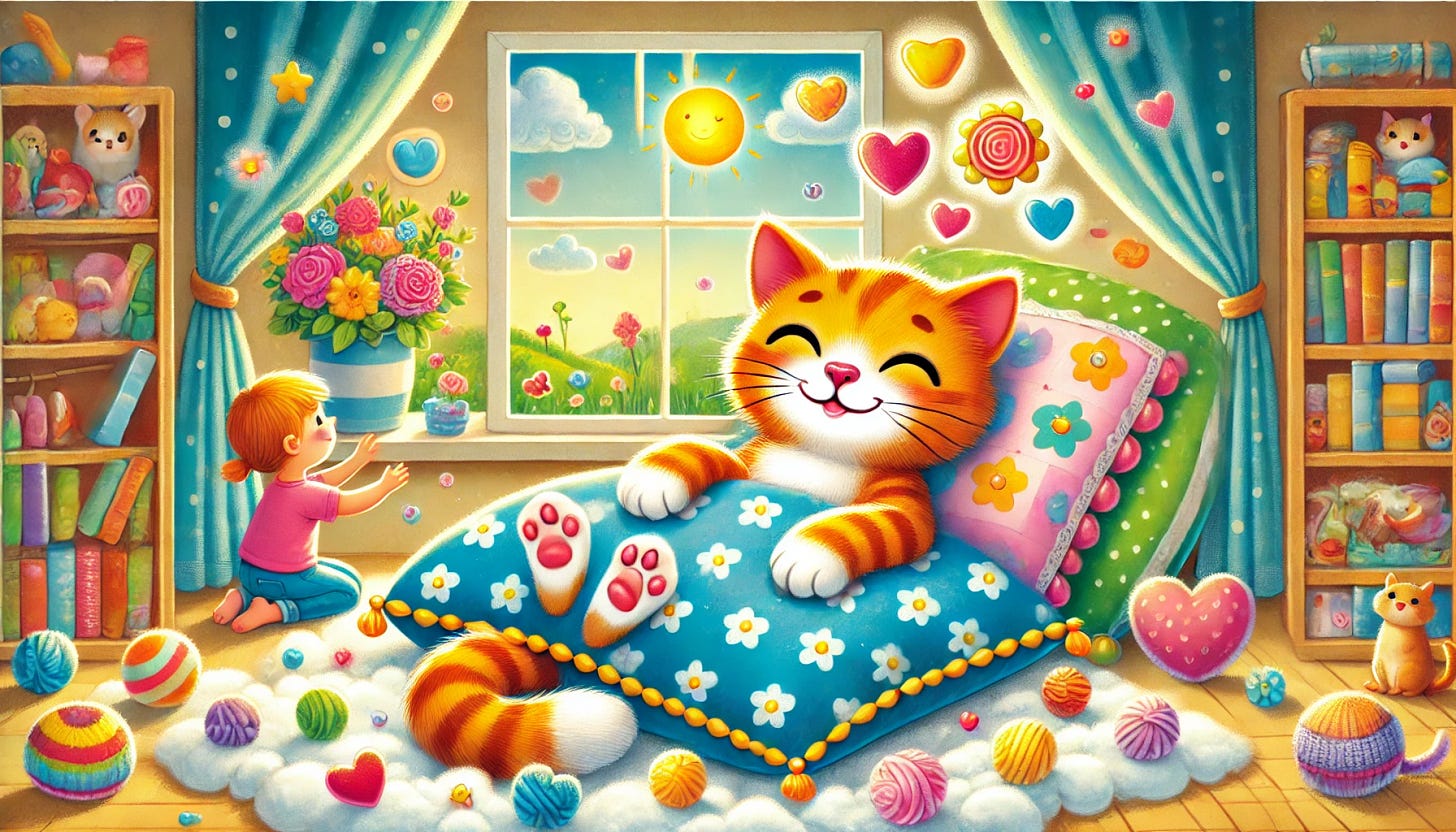Why Do Cats Purr?
Have you ever heard a cat purring? It sounds like a soft, happy rumble coming from their chest. Cats purr for many reasons, and it’s their special way of communicating. Let’s dive into the fascinating world of cat purrs and discover why they make this unique sound!
Hello my friends!
For a quick note, welcome to Tidbits with Titus, a podcast and newsletter where we tackle the big, curious questions kids ask every day in fun, bite-sized ways! I’m Alexander Titus, but I go by Titus. I’m a scientist, adventurer, and a huge fan of making science, technology, and life accessible to all ages. From “How does electricity work?” to “What are taxes?” and even “Why is the sky blue?” I’m here to dive into these wonder-filled questions with engaging stories and simple explanations that spark curiosity and make learning a joy. This effort is all about creating a space where families can learn together, discover the magic of the every day, and find thoughtful ways to explore the world’s big mysteries. Let’s make curiosity a family tradition—one tidbit at a time!
Just so you know, these podcast episodes are all AI-generated using Google’s really cool NotebookLM technology. That means there are some errors in how words are said, but that is part of the fun!
If your little ones have questions that you want help answering, shoot me an email at questions@tidbitswithtitus.com and I’ll see what I can do!
You can subscribe to the newsletter that has this information as well at tidbitswithtitus.com.
Also please share with anyone you think would be interested. The more the merrier!
Cheers,
-Titus
What Is a Purr?
A purr is a special sound that cats make by vibrating their throat and chest. It’s different from a meow or a hiss. Purring is usually a gentle, steady sound, like a little engine running. Most cats purr when they’re feeling calm and happy, but they can purr for other reasons too. Did you know that big cats like cheetahs and cougars can purr too?
How Do Cats Purr?
Cats use their bodies in an amazing way to create purring sounds. Here’s how it works:
The Voice Box: Inside a cat’s throat is something called a larynx, or voice box. This helps them make sounds like meows and purrs.
The Brain Signal: A cat’s brain sends a signal to the voice box to start vibrating.
The Muscles Work: Tiny muscles in the voice box open and close very quickly, about 25 times per second!
Air Moves: As air moves in and out when a cat breathes, the vibrations create the sound of a purr.
It’s like magic, but it’s actually science!
Why Do Cats Purr?
Cats purr for many different reasons. Let’s explore some of the most common ones:
1. When They’re Happy
Cats often purr when they’re feeling safe, cozy, and loved. If your cat is sitting in your lap, getting a gentle pet, and purring, it’s their way of saying, “I’m happy!”
2. When They’re Hungry
Have you ever noticed your cat purring at breakfast time? Some cats purr to get your attention when they’re hungry. This purr might sound a little different, almost like a mix between a purr and a meow.
3. When They’re Nervous or Hurt
Sometimes cats purr when they’re scared or in pain. It might seem strange, but purring can help them feel better. Scientists think it’s like a way for cats to comfort themselves.
4. When They’re Healing
Purring isn’t just for emotions—it can also help cats heal! The vibrations from purring are thought to help repair bones and tissues, reduce pain, and even lower stress. It’s like a built-in superpower.
Do All Cats Purr?
Not all cats purr the same way. Domestic cats, like the ones you might have as pets, are excellent purrers. Some wild cats, like cheetahs, purr too. However, big cats like lions and tigers don’t purr the same way. Instead, they roar! Scientists believe that a cat can either purr or roar, but not both.
When Do Kittens Start Purring?
Kittens start purring when they’re just a few days old. They purr to let their mom know they’re safe and happy. It also helps the mom cat know where her kittens are when they’re nursing. Isn’t that sweet?
Can Other Animals Purr?
Cats aren’t the only animals that purr. Some other animals can make similar sounds, including:
Rabbits
Guinea Pigs
Raccoons
Lemurs
Each animal has its own reason for purring, but cats are the most famous for it.
How Does Purring Help Cats?
Purring isn’t just a way for cats to talk; it actually helps them stay healthy. Here are some ways purring benefits cats:
Heals Injuries: The vibrations of a purr can help heal bones and wounds faster.
Relieves Stress: Purring helps cats stay calm and feel less anxious.
Strengthens Bones: The vibrations may help keep a cat’s bones strong.
It’s like having a soothing superpower inside their bodies!
Why Do People Love Cats’ Purrs?
Have you ever felt relaxed when your cat was purring? That’s because the sound of purring is calming for humans too. It can:
Reduce Stress: Listening to a cat purr can make you feel peaceful.
Help You Sleep: Some people find it easier to sleep with a purring cat nearby.
Bring Joy: A purring cat often makes people smile because it’s a sign of happiness.
Fun Facts About Purring
Silent Purrs: Some cats purr so quietly you can only feel the vibrations, not hear the sound.
Different Sounds: Every cat’s purr sounds a little different, just like people have unique voices.
Continuous Purring: Cats can purr while breathing in and out, which makes the sound continuous.
Purring’s Mystery: Scientists are still learning all the reasons why cats purr. It’s one of nature’s cool mysteries!
How Can You Tell What a Purr Means?
If your cat is purring, try to figure out why. Here are some clues:
Happy Purr: If your cat is relaxed, kneading, or cuddling, it’s a happy purr.
Hungry Purr: If it’s mealtime, your cat might purr to remind you to fill their bowl.
Comfort Purr: If your cat seems sick or scared, the purr might be for self-comfort.
Paying attention to your cat’s body language can help you understand their purrs better.
How Can You Make Your Cat Purr?
Want to hear your cat purr? Here are some tips:
Pet Them Gently: Most cats love being stroked on their head, chin, or back.
Cuddle Time: If your cat likes snuggling, holding them might make them purr.
Play with Them: Using toys can make your cat happy, and a happy cat often purrs.
Remember, every cat is different. Some purr more often than others.
What If a Cat Doesn’t Purr?
Not all cats purr. Some are just quieter than others, and that’s okay. If your cat doesn’t purr but seems happy and healthy, there’s nothing to worry about. They might show their happiness in other ways, like rubbing against you or wagging their tail.
Why Do Kittens and Cats Need to Purr?
Purring is important for both kittens and grown-up cats. For kittens, it’s a way to bond with their mom and show they’re okay. For adult cats, purring can help them stay healthy, reduce pain, and communicate with humans and other animals.
How Can We Help Cats Stay Happy?
If you want your cat to purr more, make sure they feel loved and cared for. Here are some tips:
Give Them Attention: Spend time playing or cuddling with your cat.
Feed Them Well: A well-fed cat is a happy cat.
Provide a Safe Home: Cats need a cozy, safe place to relax.
Visit the Vet: Regular check-ups help keep your cat healthy and happy.
Cats’ Purrs Are a Special Gift
Purring is one of the many reasons why cats are such wonderful pets. It’s their way of showing love, staying healthy, and even communicating with us. The next time you hear a cat purr, remember how special that sound is. It’s a little reminder of how amazing animals can be!












